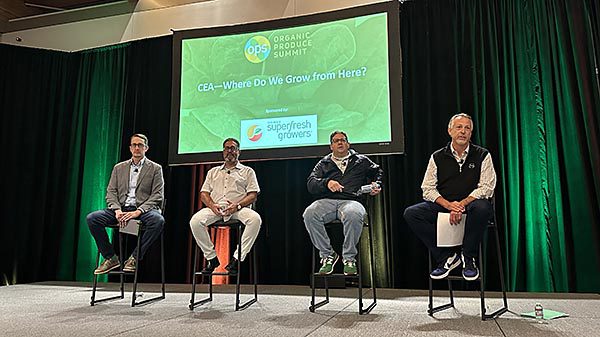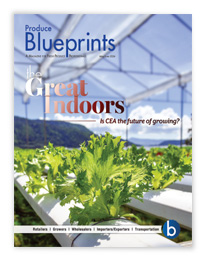MONTEREY, CA – The past few years of the controlled environment agriculture sphere have seen enormous amounts of investments, innovation, new products, new technologies, and ultimately, failures.
During the July 13 Organic Produce Summit Session, “CEA – Where do we grow from here?” two growers and a retailer shared their experiences, and vision for the space.
Moderator Todd Linsky didn’t hold anything back when he kicked off by asking who is responsible for funding innovation, and asking what panelists thought of some of the widely reported failures in the space.
Philip Karp, president of Soli Organic BB #:187801, said the reality is that many operations were making promises they couldn’t keep.
“You get to the point right now where I think promises aren’t enough,” he said. “And so people will invest in promises, people will buy promises, people will be very seduced by promises…I don’t think there’s any debate around the need or the opportunity, the importance of innovating in agriculture, but you’ve got to have something that works.”
A lot of the funding going into the space comes with expectations that don’t match the pace and reality of agriculture.
Venture capital is looking for high risk, high reward, Karp said. “And private equity is not going to put up with burn rates for a very long time. What it does come down to is the companies that are able to have unit economics, that can make sense. You gotta get it on a shelf at the price that the product is going to move and have velocity.
Dave Vosburg, chief innovation officer for Local Bounti BB #:368695, said 10 years ago many of the investors didn’t know much about agriculture, and what it takes to grow indoors.
“Five years ago, maybe they were more aware, but they were making, I would say, really bad decisions,” he said. “And in believing the hype, and imagining that somehow constructing facilities that cost tens of millions of dollars, they’re going to have VC (venture capital) returns,” Vosburg said. “I think today, we’re finally at the point where these two lines are intersecting reality and investor understanding, …and now they’re understanding what’s doable.”
Eric Cusimano, global produce principal buyer for Whole Foods Market BB #:147784, said two things hit the CEA market that dramatically slowed growth.
“No. 1, market conditions. The game pretty much changed overnight,” he said. “Profit became more of a metric of success than top line.”
Differentiation also is an issue.
“I fielded close to 100 phone calls with new growers in the past two years, and my first question is always what’s your differentiator? And, surprisingly, few have been able to answer that.”
Cusimano says he’s also more interested in the grower than the tech.
“For me personally, an operation that comes at it from a grower’s perspective always gets my attention,” he said. “If it’s coming from a tech perspective – probably not.”



